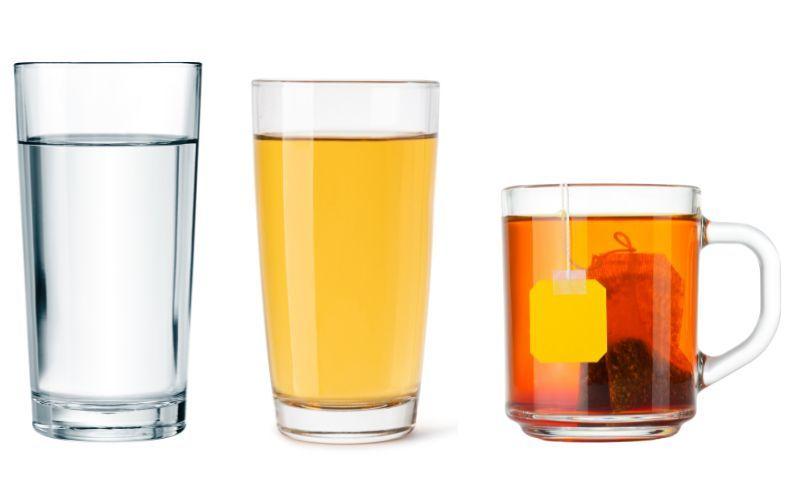In short
| What | When to stop? |
|---|---|
| Clear fluids | From 1 hour before the procedure |
| Non-clear fluids | At least 6 hours before the procedure |
| Food | At least 6 hours before the procedure |
| Breast milk or formula: only for babies under 1 year | At least 4 hours before the procedure |
| Medication | As agreed |
For organisational reasons, the ward may ask you to stop eating earlier (for example from midnight). This keeps scheduling flexible for urgent procedures and allows you to be treated sooner if other procedures are cancelled or moved.
You may still drink clear fluids up to 1 hour before your procedure.
Clear fluids – up to 1 hour beforehand
You may sip small amounts of clear (transparent) fluids up to 1 hour before the procedure. This provides comfort and may aid recovery.
Examples of clear drinks:
- Water (still or sparkling)
- Coffee without milk
- Tea without milk
- Clear lemonade or transparent isotonic sports drink
- Apple juice without pulp

Clear fluids leave the stomach quickly and are therefore not risky if you receive anaesthesia. Water passes through the stomach in about 12 minutes. Carbohydrate-rich drinks such as some sports drinks stay a little longer, but are also gone within 90 minutes.
Non-clear fluids – up to 6 hours beforehand
Non-clear fluids are not transparent and contain for example milk, pulp or fibres. They remain longer in the stomach. Stop these at least 6 hours before the scheduled time of your procedure.
- Milk, plant-based milk, chocolate milk
- Yoghurt and yoghurt drinks
- Smoothies
- Juice with pulp
- Coffee or tea with milk (not even a small amount)
- ...
Stop alcoholic drinks at least 6 hours before the procedure.
Food – up to 6 hours beforehand
Solid food takes time to digest. Do not eat from at least 6 hours before the scheduled time of your procedure. The day before you may eat normally, but avoid very late or very fatty meals.
Bottle-feeding or breastfeeding
Babies up to 1 year may have bottle-feeding or breastfeeding up to 4 hours beforehand. For older children, the above rules apply.
Medication
Take your medication as agreed beforehand. Swallow tablets with a small glass of water.
Pregnant women often receive specific medicines to control stomach contents and acidity. The doctor will always discuss this with you in advance. Do not take such medication on your own initiative.
Frequently asked questions
Anaesthesia reduces or temporarily blocks pain signals or consciousness during medical procedures. It may involve medicines that relax the whole body (sedation or general anaesthesia) or numb only a specific area (local or regional anaesthesia). A combination is sometimes used. An anaesthetist is always involved.
Yes. You must fast for any form of anaesthesia, including regional anaesthesia (spinal or anaesthesia of an arm or leg). This is because it is sometimes combined with sedation or it may be necessary to switch to general anaesthesia during the procedure, for example if the regional anaesthesia is insufficient or does not last long enough when the procedure overruns.
By fasting from midnight, your operation, examination or procedure can be scheduled more flexibly.
If the person scheduled before you cannot attend due to unforeseen circumstances, we can bring your procedure forward if you have been fasting long enough. Not eating after midnight can make all the difference.
Depending on the schedule, you may exceptionally be allowed to have breakfast, but you will always be contacted specifically about this.
In principle, you may take all your regular home medications – except blood thinners – as usual, unless the anaesthetist or a nurse gives you different instructions.
In some cases, the anaesthetist will prescribe additional medication beforehand to ensure the procedure is safe. Examples include heart medication, medicines to prevent epileptic seizures, or medicines to protect your stomach.
Chewing gum or hard sweets are allowed up to 2 hours before the procedure, provided you do not swallow them.
If chewing gum or hard sweets are swallowed, this counts as food and is therefore not allowed from 6 hours before the procedure.